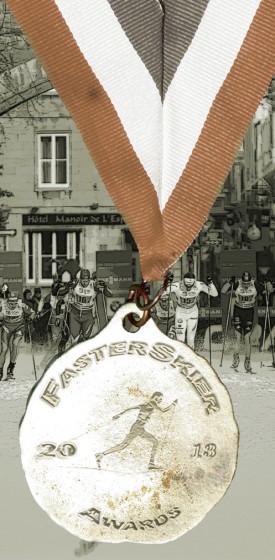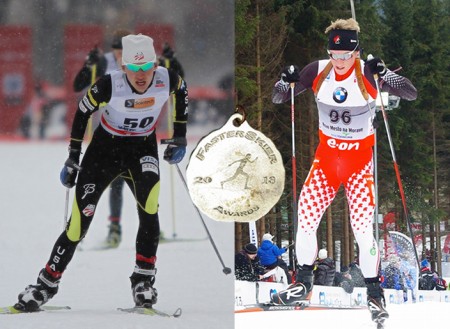
After yesterday’s Collegiate Skier of the Year awards, we’re moving on to Rookie of the Year, always a tough category to decide. We’ve focused on World Cup-level competition, and at that level it truly takes years to become a veteran – so we don’t define “rookie” strictly as someone who is starting their very first World Cups, just someone who is pretty new to the stage but has already impressed with strong results.
This year, our awards go to a pair of athletes who, at age 22, started their first World Championships and scored significant World Cup points despite not spending the whole season on the sport’s toughest circuit. Many of our past Rookie of the Year picks have gone on to incredible success – paging Alex Harvey, Lenny Valjas, and half the U.S. Ski Team – and we have no doubt that these two can, too.
Scott Gow, Biathlon Canada National Team
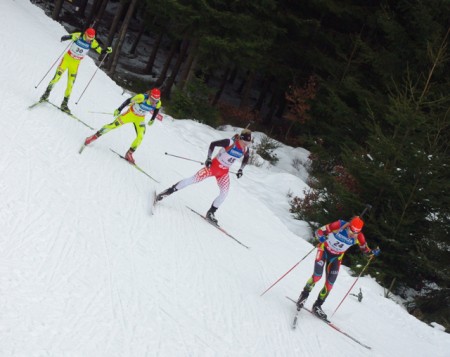
Gow’s first World Cup starts came at the beginning of last season, after he excelled at trials races in Canmore. The Canadian biathlon team offered him a spot for the openers in November 2011, but they went as first World Cups often do – they were tough. After placing 80th and 101st, Gow bounced back down to a lower level of racing.
But he returned this season an older, stronger athlete, and secured two 50th-place finishes in his first weekend of World Cup starts, the third event of the season. A few weeks later in Ruhpolding, Germany, Gow earned his first points, and his first top-30 finish, after shooting clean to place 29th in a 10 k sprint.
Gow, a successful racer at the junior worlds level a few years ago, had clinched a spot at his first World Championships. There, he collected a 31st-place finish in the 20 k individual.
His best season to date came at a good time for Canada, too, as Brendan Green, one of their best racers the year before, was out with a back injury. In fact, in several competitions late in the season, Gow was the top performer for Canada.
“I try to just pretend that it’s like racing at home, but it’s a little overwhelming at times,” he told FasterSkier at World Championships. “I don’t know how I did it. I just came out to training and to race like, don’t think about it, don’t think about it, don’t think about it. Don’t worry about the crowds or the enormous amount of people or any of that stuff. It has paid off so far.”
Sophie Caldwell, SMS T2
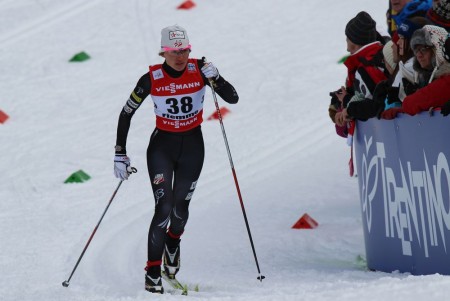
In many ways, Caldwell is everything you’d think an American World Cup rookie might be: after a strong junior career and an impeccable college resumé, she hit her first season as part of an elite senior team and skied strong domestic races early in the season to earn her way on to the World Cup. But not many rookies can realistically hope to achieve what Caldwell did: making the quarterfinals in her very first World Cup sprint, in Quebec. In fact, Caldwell only narrowly missed the semis.
She hit the heats again in Canmore, which solidified her spot as a sprinter almost on par with the U.S. Ski Team’s own, even though she was still learning how to race the heats at that level of competition. That gave the Stratton racer a few more starts in Europe and a chance at World Championships, where she placed 20th in the sprint, the only race she was picked to start. She finished as the second American, one place behind Kikkan Randall.
“She skied great and she’s been demonstrating all season long that she’s been able to make a big step forward,” U.S. Ski Team coach Chris Grover told FasterSkier at the time. “She’s going to be one of our contenders for the future.”
And oh yeah – Caldwell also made the time to compete at U23 World Championships, where she qualified fifth and placed ninth in the sprint. Despite three trips to World Juniors, this was her first U23 Championships.
With just seven sprints to her name – she also contested the 10 k classic and the skiathlon in Canmore, as well as Quebec’s team sprint – Caldwell landed 53rd in the World Cup sprint rankings, hinting that she could have had an even bigger presence with more starts. As such, her performances earned her a nomination to the U.S. Ski Team for 2014, no small task this season.
Honorable Mention:
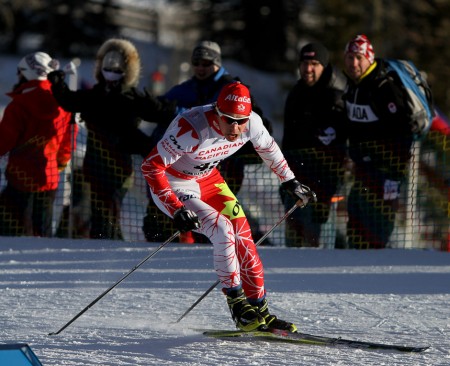
APU athlete and U.S. Ski Team D-teamer Erik Bjornsen saw his first year of World Cup action, and could have been considered for this award. On the domestic circuit, his racing was impeccable. That earned him World Cup starts in Canada, Davos, and Liberec, as well as a spot at World Championships, where unlike Caldwell he started nearly the whole slate of events. Bjornsen finished 48th in the 15 k skate, and paired up with Andy Newell to place 14th in the team sprint. The fact that we ultimately picked Gow, whose top-30 on the World Cup and 31st place at World Championships put him a notch above Bjornsen, just highlights how difficult it was to pick a male winner this year.
There were lots of other World Cup rookies this season, since skiing’s circuit traveled to Canada so North American teams were allowed to field nations group racers. Among the other standouts were Jesse Cockney, who notched a surprise second-place qualification round for Canada in the Canmore sprint before ultimately placing ninth, and American Rebecca Rorabaugh, who placed 18th in the sprint in Quebec.
In Europe, too, there were rookies. Hannah Dreissigacker and Audrey Vaillancourt made their first World Championships appearances for the American and Canadian biathlon teams, and skier Dakota Blackhorse-von Jess started World Cup sprints for the U.S. in Davos, Lahti, and Drammen based on his domestic results. And, of course, there were the racers that earned their starts through being SuperTour and NorAm leaders, like Rosie Brennan and Mike Somppi.
But what set Gow and Caldwell apart from the rest was their seeming ability to – with a fair degree of consistency – translate their ski speed in domestic racing directly to the World Cup. It’s not something that many rookies can do: look at Bjornsen and Blackhorse-von Jess, for instance, who had strong results at U.S. Nationals against Torin Koos. All three skiers made appearances on the World Cup later in the season, but while veteran Koos was able to seamlessly jump back to that level and qualify for sprint heats, Bjornsen and Blackhorse-von Jess had more rookie moments: they were clearly adjusting to the new scene and often finished in the 50’s or lower. That experience will allow them to succeed in the future, but it won’t be a quick or automatic transition.
Caldwell, on the other hand, if anything upped her game on the biggest stage. She performed well at U.S. Nationals, U23’s, and European Continental Cup racing, but hitting the top 20 on the World Cup probably represented her best racing of the season, and it came when it counted. Gow, too, as able to fare about as well against his usual Canadian competitors on the World Cup as he probably would have at home – if not better. All that “not thinking about it” allowed him to overcome the overwhelmingness that often confronts rookies, and earned him top honors along with Caldwell.
Previous Winners
Lenny Valjas (CAN)
Jessie Diggins (USA)
2010
Simi Hamilton (USA)
Holly Brooks (USA)
2009
Alex Harvey (CAN)
Morgan Arritola (USA)
2008
Garrott Kuzzy (CAN)
Liz Stephen (USA)
Chelsea Little
Chelsea Little is FasterSkier's Editor-At-Large. A former racer at Ford Sayre, Dartmouth College and the Craftsbury Green Racing Project, she is a PhD candidate in aquatic ecology in the @Altermatt_lab at Eawag, the Swiss Federal Institute of Aquatic Science and Technology in Zurich, Switzerland. You can follow her on twitter @ChelskiLittle.

